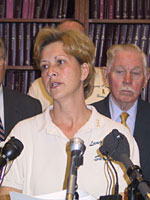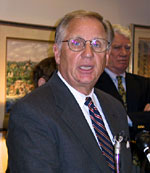By Tom Scheck
Minnesota Public Radio
May 1, 2002
Minnesota Attorney General Mike Hatch says he'll ask the Ramsey County District Court judge to switch control of a portion of the state's tobacco endowment to a panel that includes two former governors. Hatch recently filed a lawsuit to remove the $202 million endowment from Minnesota Partnership for Action Against Tobacco to a five-person panel. Hatch and MPAAT officials have been arguing over how the indpendent non-profit uses the money.
| |
|
|
|
||
Nearly a dozen lung cancer survivors and two former governors flanked Attorney General Mike Hatch as he announced his recommendations for a new board to oversee the $202 million fund.
Cancer survivor Connie Berchem of Forest Lake says lung cancer is the #1 cancer killer in the U.S. She says she expected the state to direct some money to lung cancer research after it settled its lawsuit with tobacco companies in 1998.
"When the state of Minnesota sued the tobacco companies, supposedly they were suing to recover money on behalf of addicted Minnesota smokers and so when the state won the case, the court awarded this money to help us. So far not one dime of this settlement money has gone to helping toward research for lung cancer," Berchem said.
Berchem says she'd like to see half of the money given to the University of Minnesota so a major cancer research center could be established. She says the state Health Department could use the other half of the money to help with detection and treatment. Those are also the recommendations of Attorney General Hatch.
He filed a lawsuit to transfer control of the funding from MPAAT to the U of M and Health Department because he claims the independent non-profit is misusing its funds.
| |
|
|
|
||
The court settlement requires MPAAT to use the money for both medical research and tobacco cessation projects. Hatch says the group has been recklessly pursuing indoor smoking bans throughout the state. He also says MPAAT is engaged in a conflict of interest because 80 percent of its grants go to organizations that members on MPAAT's board of directors are involved with.
As he pointed to the cancer survivors, Hatch said he thinks the money could be better spent. "These are the people who were defrauded. It wasn't people who weren't born yet, it wasn't the people who don't smoke. It wasn't the taxpayers. They are now dying, they have lung cancer. So let's set up two funds to help them quit, they would like to see that done for families and for others. And number two, let's see if we can do see some research on the disease, maybe we can cure something," Hatch said.
Hatch says he'll also recommend that the fund be overseen by a five-person committee. He says he'll recommend former governors Arne Carlson and Wendell Anderson as two of the members.
Carlson has been a long-time critic of MPAAT. In 1998, a few months before leaving office, he called it "a scandal waiting to happen." He maintains that position today.
"We as public servants have an obligation to serve the greater good and when a mistake is made we have an obligation to correct it and to acknowledge that something wrong did in fact occur. The settlement and the way the settlement came about and the way it was handled was fundamentally flawed," Carlson said.
| |
|
|
|
||
MPAAT board member and Minneapolis Veteran's Administration Hospital Dr. Anne Joseph say the group is spending the money appropriately. She says they've taken steps to make sure there are no conflict of interests when determining grants.
Joseph says shifting the funds to the University of Minnesota and Health Department may seem appropriate now but says others may want it go elsewhere at a later date.
"Doesn't this series of proposals prove a point? Once these dollars are in the political world, there are always going to be competing demands for the funds. It's time to stop politicizing this issue," she said.
Joseph says MPAAT is moving forward with its tobacco control plans because they are effective over the long-term. Joseph and other medical professionals say a combined policy of smoking cessation programs and a ban on indoor smoking is proven to lower smoking rates.
Ed Sweda, with Northeastern University's Tobacco Control Resource Center, filed a friend-of-the-court brief supporting MPAAT's policy.
"What we have seen from Mr. Hatch's statements in terms of saying as putting it as an either or that MPAAT should spend the money on smoking cessation instead of these efforts at smoke free laws. That really tells me he has a tunnel vision," Sweda said.
Oral arguments are scheduled for May 17.
More from MPRMore Information



